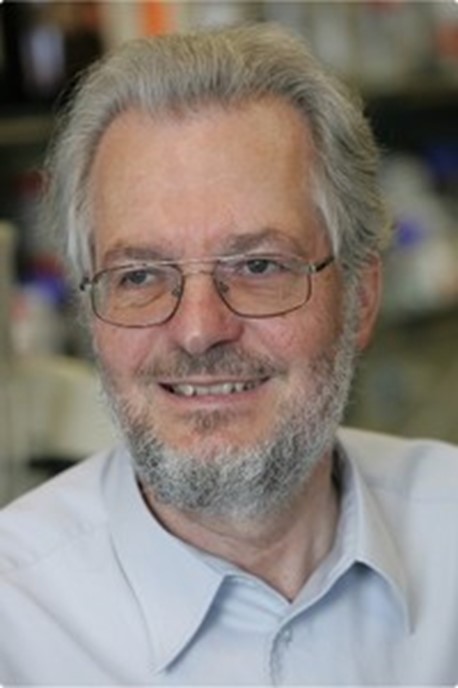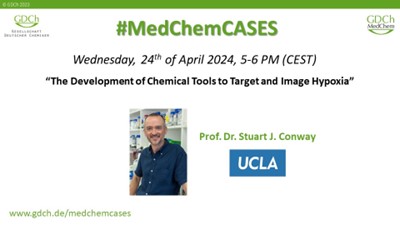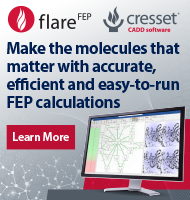|
|
RELEASE OF THE BEST PRACTICES FROM HITS TO LEAD GENERATION SET
In their fourth set, the EFMC Best Practice in Medicinal Chemistry working group share insights gathered from experienced practitioners from industry and academia and illustrate the guidelines with two case studies on the discovery of allosteric MALT1 inhibitor leads and HSD17B13.
The hit to lead phase is critical in medicinal chemistry campaigns. The chemical matter, or hits, that demonstrate promising activity against a target of interest are further characterized. Through limited medicinal chemistry efforts, the aim is to turn these hits into leads: compounds that we believe can be optimized into drug candidates.
- How do we select the most promising chemical matter from all hit series?
- How do we start optimizing a scaffold?
- How do we ensure that we optimize compound properties to get to good leads?
- How do we make sure the optimization is progressing as it should?
- When do we know when to stop working on a chemical series?
The material is available in several formats: freely accessible webinars on the EFMC YouTube channel, educational slide decks and case studies. These are freely accessible for personal use or for use in further training or teaching material.
Find more on https://www.efmc.info/hit-to-lead
MEET THE CRESSET TEAM AT MEDCHEMFRONTIERS 2024
 |
Free Energy Perturbation (FEP) offers a quantitative method to reliably calculate relative binding affinity, enabling accurate ranking of molecules in a congeneric ligand series. With its user-friendly interface, a calculation in Flare™ FEP is easy to set up, run and troubleshoot, and enables highly accurate prediction of binding affinity, prioritizing the best molecules to synthesize. Learn more.

|
LAST SEATS AVAILABLE FOR THE 18TH EFMC SHORT COURSE ON MEDICINAL CHEMISTRY
Do not miss the opportunity to secure one of the last seats for the intensive 3-day course on Transformative Approaches in Medicinal Chemistry, with Applications in Cancer Research.
The EFMC Short Course will take place in Oegstgeest, The Netherlands on April 21-24, 2024, and will cover advanced methods, new technologies and tools available for medicinal chemists, with a focus on oncology drug discovery, including fragment based-drug discovery, DNA-encoded library technologies, covalent drug discovery and small molecules that target RNA.
Organised by Prof. Mike Waring & Dr Hannah Steward (Newcastle University), the course is limited to 35 participants, to allow in-depth discussion with the expert speakers.
LITERATURE SPOTLIGHT
The “literature spotlight” section of the newsletter will bring you a summary of recently published research in a concise and accessible way. Multiple thematics from different journals will be highlighted thanks to the valuable contribution of members of the EFMC working groups.
This contribution will focus on the recently published article on "Systematic Analysis of the MIO-forming Residues of Aromatic Ammonia Lyases" by M.Sc. Yannik Brack, Dr. Chenghai Sun, Prof. Dr. Dong Yi and Prof. Dr. Uwe T. Bornscheuer.
Brack et al. studied aromatic ammonia lyases (AALs) and tyrosine/phenylalanine ammonia mutases (TAM/PAM) and their catalytically important residues. These enzymes belong to the 3,5-dihydro-5-methylidene-4H-imidazol-4-one (MIO)-dependent enzyme family and have great potential in the production of various unnatural amino acids and treatment of phenylketonuria or tyrosinemia.
The enzymes function by forming a MIO moiety autocatalytically from various tripeptides. Although most of the enzymes with the MIO moiety carry the classical ASG residues, a few enzymes are known to contain other amino acids as first residues in the MIO triad. The authors performed a phylogenetic tree analysis of the MIO-forming residues of AALs and confirmed the various MIO triads with mutational studies. They identified several protein clusters with AAL-like enzymes that contain unusual MIO-forming motifs (ACG, TSG, SSG, and CSG).
The systematic study of MIO triads reported provides avenues for future functional predictions and mutagenesis research of AALs which could lead to enhanced enzymes for industry and biochemical applications.
https://chemistry-europe.onlinelibrary.wiley.com/doi/10.1002/cbic.202400016 3rd EFMC² TANDEM TALKS
The EFMC² Tandem Talks series, jointly organised by the EFMC and the EFMC Computational Chemistry Initiative (EFMC²), returns to give you real life insights into how medicinal and computational chemists can drive projects together. The tandem talks feature a balanced perspective from both sides.
The third edition will take place on May 28 from 16:00 to 17:00 CET. Ed Griffen & Jess Stacey (Medchemica Ltd) will deliver a lecture on “Accelerating Lead Optimisation by Constantly Rebuilding Free Wilson Models Using Automated Core Finding in Anti-Viral Drug Discovery” before joining the round table discussion to interact with the attendees.
More information and registration on www.efmctandemtalks.org.
Interested in becoming the exclusive sponsor of the event and benefit from extended visibility toward this highly targeted audience? Reach out to administration@efmc.info for more information.
MEET HORST KESSLER, INSTITUTE FOR ADVANCED STUDY OF THE TECHNICAL UNIVERSITY MUNICH (IAS-TUM) AND BAVARIAN NMR CENTER (BNMRZ), GERMANY
In this edition, our MedChemBioConversations is Prof. Horst Kessler, retired from the Institute for Advanced Study of the Technical University Munich (IAS-TUM) and Bavarian NMR Center (BNMRZ), Germany
Get to know him better by reading the interview below:

How did you get interested in Medicinal Chemistry?
As I wrote in my very recently published scientific autobiography in the Serie Lives in Chemistry (https://l-i-c.org/horst-kessler.html), I was trained as Organic Chemist (synthesis of small ring compounds) at the University of Tübingen under the guidance of Eugen Müller in my Ph.D. After my thesis I studied rapid intramolecular rearrangements by NMR-spectroscopy. After habilitation I obtained a call to the Johann-Wolfgang-Goethe-University in Frankfurt as Full-Professor at the age of 31 years.
There I became interested in peptide synthesis and conformational studies by NMR. After 18 years in Frankfurt I moved as professor of Organic Chemistry and Biochemistry to the Technical University Munich (TUM). We developed a number of novel multidimensional NMR techniques in combination with molecular dynamics to achieve reliable pictures of peptide conformations. This knowledge was used to design biological active conformationally restrained peptides with super-activities and receptor subtype selectivity.
My interest shifted to application of those peptides as drugs of for molecular imaging (after radiolabeling for SPECT and PET). Finally, my main interest was in the design of orally active peptides (via conformational restraints and multiple N-methylation.
Where are you currently working and what is your current position?
After my official retirement in 2008, I became a member of the IAS and member of the Senior Excellence Faculty and was granted to do lab work until 2019.
My main interest was the development of super-active and selective ligands for RGD-recognizing the cell-adhesion receptors, the integrins. We were able to develop (in our opinion the ligands with highes affinities (sub-nanomolecular) and very high selectivities (several orders of magnitude) against other integrin subtypes (for αvβ3, αvβ6, αvβ8, α5β1 and αIIbβ3). Some of these ligands are now used in the clinics are in clinical phase I – III, e.g. for the detection of cancer (see trivehexin for αvβ6 or pentixafor for the the chemokine CXCR4).
My general interest was the modification of bioactive peptides in compound for medical use. For this we introduced very early the concept of conformational restraint and used it under conformational control by NMR. Peptidic drugs should be at best orally available. In some cases it was possible to pin down the essentials for oral availability.
I am 83 years old and retired.
What do you consider your greatest achievement in your scientific career?
I contributed to the whole field of peptides as drugs (synthesis, conformational based design, applications for Molecular Imaging) which is described in my autobiography.
What advice would you give to someone who wants to know more about your field?
As scientist one should always look for interesting new facts which are not yet fully understood. If you find out some novel features, ask how this could be converted in useful application, but do not restrain your mind too early in applications. If you do only application on a known background I would call it “technology”, not “science”.
What is the most embarrassing thing you have done in the lab while doing experiments, e.g. explosions?
As many chemists I began my interest in chemistry in my own lab (at the age of about 13 years). Nowadays it would be impossible to get all the dangerous chemicals which I used. I had a severe explosion when I was very young. My advice: “do not start with lab work when you do not fully understand what you are doing”.
Which field of medicinal chemistry do you consider the most promising for the future?
It is difficult to make predictions, especially it they are for the future. NEWS FROM EUCHEMS: NOMINATIONS ARE OPEN FOR THE 2024 EUCHEMS YOUNG CHEMISTS' AWARD
Our colleagues from EuChemS have the pleasure to bring to your attention that the call for nominations for the 2024 EuChemS Young Chemists' Award (EYCA) is open.
The aim of the EuChemS Young Chemists’ Award (EYCA) is to showcase and recognize the excellent research being carried out by young scientists working in the chemical sciences. The award is intended to honour and encourage younger chemists whose current research displays a high level of excellence and distinction. It seeks to recognise and reward younger chemists of exceptional ability who show promise for substantial future achievements in chemistry-related research fields.
The deadline for nominations is 19 April 2024. Please note that only self-nominations are allowed.
EYCA finalists will present their research at the 9th EuChemS Chemistry Congress, which will be held in Dublin, Ireland, on 7-11 July 2024. The award will be presented to the winners at the congress.
More information and application on www.euchems.eu/awards/european-young-chemists-award. #MEDCHEMCASES - SEMINAR BY THE DIVISION OF MEDICINAL CHEMISTRY OF THE GERMAN CHEMICAL SOCIETY (GDCH)
The MedChem Division of the German Chemical Society (GDCh) would like to invite you to the next #MedChemCASES online seminar which will be held on April 24 (5.00pm) by Prof. Dr. Stuart J. Conway
The topic of the webinar will be “The Development of Chemical Tools to Target and Image Hypoxia”.

Tumor hypoxia (low oxygen levels) is associated with resistance to all therapeutic approaches to treat cancers, and consequently poor patient prognosis. Hypoxia-activated prodrugs (HAPs), designed to selectively release a bioactive compound in oxygen-deficient cells, while sparing healthy tissue, represent a promising therapeutic strategy for treatment of cancers. [1,2] I will discuss our recent work to develop HAPs applied to a lysine deacetylase (KDAC) inhibitor and PROTACs. We have developed NI-Pano (CH-03), a novel hypoxia-activated version of the clinically approved KDAC inhibitor, panobinostat. We demonstrated the pre-clinical efficacy of NI-Pano, showing that it is stable in normoxic (21% oxygen) conditions but undergoes NADPH-CYP-mediated enzymatic bioreduction to release panobinostat selectively in hypoxia (
Register for free here.
#GDCh (MedChem Division), #NextGenMedChem.
References
(1) Cazares-Korner et al. ACS Chem. Biol. 2013, 8, 1451–1459.
(2) O’Connor et al. Nat. Protoc. 2016, 11, 781–794.
(3) Skwarska, Calder et al. Cell Chem. Biol. 2021, 28, 1258.
(4) Tosun, Wallabregue, Mallerman et al. JACS Au 2023, 3, 3237. NEWS FROM THE BIOLOGICAL AND MEDICINAL CHEMISTRY SECTOR (BMCS) OF THE ROYAL SOCIETY OF CHEMISTRY (RSC)
The BMCS is happy to announce several upcoming events.
Hot Topics: Covalent Drug Discovery 2024
16th May 2024, Virtual
Registration is now open!
Website: https://www.rscbmcs.org/events/hottopicscdd24/
Synopsis: Covalent binding has emerged as a key strategy in contemporary drug discovery. This online, half-day meeting will bring together experts from both academia and industry to discuss recent advances in using covalent small molecules to target challenging protein targets. The BMCS Hot Topics online meetings are intended to highlight breaking areas of research in fields of science relevant to drug discovery. They will run as stand-alone half-day virtual events, 2-3 times per year. The programme will be targeted towards researchers working who would like to enhance their understanding of these nascent or developing fields.
4th Synthesis in Drug Discovery and Development
4th – 5th June, Virtual
Registration is now open!
Website: https://www.rscbmcs.org/events/sddd24/
Synopsis: Synthesis is at the heart of drug discovery and development. The industry has increasingly demanded higher quality clinical candidates and has sought to exploit less druggable biological targets. Densely functionalised small molecules with a high degree of synthetic complexity are often the result of these demands. Successful programmes therefore require the application of innovative synthesis in all stages of discovery and development. The medicinal chemist’s toolbox is also enhanced by the introduction of novel bioisosteres, often made available only through the application of new synthetic methods. This symposium aims to celebrate the crucial role of synthesis in the success of drug discovery and development.
3rd RSC / SCI New Therapeutics for Global Health
9th – 11th September 2024, Cranfield Management Development Centre, Cranfield University, Milton Keynes
RSC/BMCS/SCI
Abstract submissions are now open!
Website: https://www.rscbmcs.org/events/ntgh24/
Synopsis: Tuberculosis, malaria and diseases caused by a diverse range of pathogens, including flaviviruses (eg dengue, West Nile), kinetoplastids (causative agents of Chagas disease, leishmaniasis, etc) and gut pathogens (worms, bacteria, parasites),
remain a cause of high mortality across the globe. Fortunately, an ever-improving understanding of the complex life-cycles of these disease-causing pathogens is presenting increasing opportunities for those seeking to tackle these global health problems. This meeting will focus on medicinal chemistry approaches to developing new medicines for diseases affecting global health. Keynote talks from international experts from industry and academia, alongside perspectives detailing case histories in drug discovery, will highlight the latest developments in the field whilst also showcasing the opportunity for creativity and innovation.
9th GPCR’s in Medicinal Chemistry
2nd – 4th October 2024, Evotec Campus Levi-Montalchini, Verona, Italy
Registration is now open!
Website: https://www.rscbmcs.org/events/gpcrs24/
Synopsis: The key role of G protein-coupled receptors (GPCRs) in human disease underpins their importance to modern medicine. We were pleased to hold this 9th meeting in the series on GPCR drug discovery, which combined cutting edge medicinal chemistry with innovative structural biology and novel drug design approaches.
6th RSC-BMCS/DMDG New Perspectives in DMPK
Monday 17th June, 2024 Liverpool Medical Institute,
Abstract submissions and registration is now open!
Website: https://www.rscbmcs.org/events/dmpk24/
Synopsis: Novel small-molecule-based therapeutic approaches represent a key component of the discovery landscape. The emergence of molecular glues, PROTACs, bicyclic peptides, and other novel chemistries often bring with them new challenges for drug discovery scientists; synthetic difficulty, beyond rule-of-five physicochemical properties, and complexity in the link between exposure and response, may complicate ADME characterisation and accurate human dose prediction, particularly for drugs aimed at oral administration. This meeting will provide a forum for the exchange of ideas between principal members of the DMPK research community on how we can rise to these challenges. Keynote talks from thought leaders will provide wider perspectives on how DMPK can contribute to the delivery of medicines to patients more quickly and efficiently. There will be a balanced mix of oral and poster presentations, and networking opportunities throughout.
3rd RSC / SCI New Therapeutics for Global Health
9th – 11th September 2024, Cranfield Management Development Centre, Cranfield University, Milton Keynes
Abstract submissions are now open! Registration is now open!
Website: https://www.rscbmcs.org/events/ntgh24/
Synopsis: Tuberculosis, malaria and diseases caused by a diverse range of pathogens, including flaviviruses (eg dengue, West Nile), kinetoplastids (causative agents of Chagas disease, leishmaniasis, etc) and gut pathogens (worms, bacteria, parasites),remain a cause of high mortality across the globe. Fortunately, an ever-improving understanding of the complex life-cycles of these disease-causing
pathogens is presenting increasing opportunities for those seeking to tackle these global health problems. This meeting will focus on medicinal chemistry approaches to developing new medicines for diseases affecting global health. Keynote talks from international experts from industry and academia, alongside perspectives detailing case histories in drug discovery, will highlight the latest developments in the field whilst also showcasing the opportunity for creativity and innovation. |
|
|
|
|
|
ISSUE SPONSORED BY

EFMC ORGANISED EVENTS
April 8-11, 2024
Utrecht, The Netherlands
EFMC-ACSMEDI Medicinal Chemistry Frontiers 2024
April 21-24, 2024
Oegstgeest, The Netherlands
18th EFMC Short Course on Medicinal Chemistry
September 1-5, 2024
Rome, Italy
XXVIII EFMC International Symposium on Medicinal Chemistry (EFMC-ISMC 2024)
September 5-6, 2024
Rome, Italy
11th EFMC Young Medicinal Chemists' Symposium (EFMC-YMCS 2024)
EFMC SPONSORED EVENTS
April 25, 2024
Stevenage, United Kingdom
RSC-BMCS 35th Medicinal Chemistry in Eastern England
May 13-15, 2024
Biarritz, France
European Symposium on Biological and Organic Chemistry (ESBOC57)
May 16, 2024
Virtual Event
BMCS Hot Topics: Covalent Drug Discovery 2024
June 4-5, 2024
Virtual Event
4th Synthesis in Drug Discovery and Development
July 3-5, 2024
Bordeaux, France
58th International Conference on Medicinal Chemistry
July 12, 2024
Madrid, Spain
X Symposium of Medicinal Chemistry Young Researchers of the Spanish Society of Medicinal Chemistry (SEQT)
July 22-23, 2024
Galway, Ireland
International Chemical Biology Ireland Conference
September 22-26, 2024
Barcelona, Spain
24th EuroQSAR
EFMC CERTIFIED SCHOOLS
June 30 - July 4, 2024
Urbino, Italy
43rd Advanced Course of Medicinal Chemistry and Seminar for PhD students (ESMEC 2024)
August 25-39, 2024
Bergün, Switzerland
Swiss Summer School 2024 in Chemical Biology
October 13-18, 2024
Leysin, Switzerland
15th Swiss Course on Medicinal Chemistry 2024
EFMC SPONSORED SCHOOL
July 1-5, 2024
Oss, The Netherlands
Radboud Summerschool: Introduction into Preclinical Drug Discovery
September 18-20, 2024
Rimini, Italy
Summer School on Pharmaceutical Analysis 2024 (SSPA2024)
JOB PORTAL
Research Scientist in Biochemistry, Edelris, FRANCE
Read more
PhD Chemistry, Chemical Biology, Proteomics, Leiden University, THE NETHERLANDS
Read more
|
|
